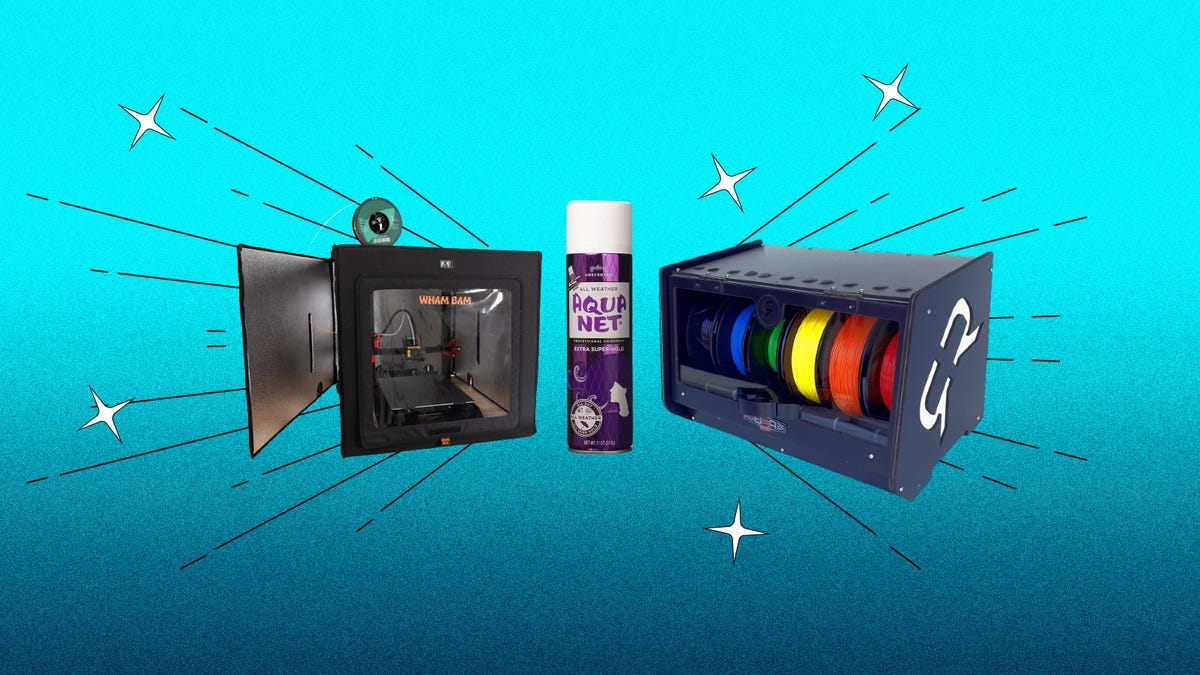
Best overall beginner 3D-printing accessory
Buildtak 3D-printer scraper
View details
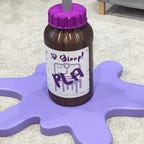
Best accessory for fusing parts together
3D Gloop! 3D-printing adhesive
View details
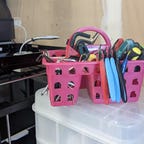
Keep all your 3D-printing accessories together
Portable caddy basket
View details
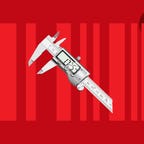
3D-printing accessory for design
Digital calipers
View details
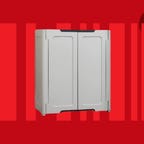
Modular storage for your 3D-printing filament
HDX stackable garage storage
View details
Best 3D-printing accessory for bed adhesion
Magigoo 3D-print-bed adhesive
View details
Best budget 3D-printing-bed adhesion
Aqua Net firm-hold hair spray (3 pack)
View details
Best deburring tool for 3D printing
Vastools swivel head deburring tool
View details
Best 3D-printing accessory for metric screws
AmazonBasics metric/imperial hex key wrench set
View details
Keep your 3D-printing material dry
Reusable desiccant pouches (5 pack)
View details
Water washable adhesion
Elmer’s glue stick (7 count)
View details
Best intermediate 3D-printer accessory
Mintion Beagle V2 3D-printer camera
View details
3D-printing accessory for protection
Wham Bam HotBox
View details
A 3D-printing accessory for a 3D-printing accessory
E3D ObXidian hardened nozzle
View details
Store your 3D-printing filament for use
Repkord RepBox (currently sold out)
View details
No matter how advanced you are in a profession or hobby, there are often tools and accessories that make everything easier, and 3D printing is no exception. Often these accessories are simple — a set of snips for cutting filament or a bit of glue to help bed adhesion — but there are also new pieces of hardware that can significantly improve your print quality or give your 3D printer powers it never had before. More than that, though, good accessories can make even the best 3D printers run above and beyond their normal scope.
What’s the best 3D-printing accessory?
It’s hard to pin down an overall best in terms of accessories, because it will depend on your needs, but the BuildTak print removal tool is the first accessory I suggest that people buy when they’re starting out. It’s affordable and works much better than the terrible scrapers that come with the typical 3D printer.
After that, you should look to get a camera like the Beagle 2. The Beagle allows you to use a mobile app to wirelessly monitor a lot of 3D printers, especially some of the best budget 3D printers. The video feed is great for making time-lapses for social media too.
After nearly a decade of 3D printing, I’ve amassed a huge number of helpful accessories and have researched many others. Amazon is a great resource for finding basic 3D-printing accessories, and California-based MatterHackers has everything you need for more advanced upgrades and gear.
Best 3D-printer accessories for beginners
Though every 3D printer comes with a paint scraper you can use to remove models from the build plate, not all are created equal. Most 3D-printer scrapers don’t allow you to get the blade low enough to lift a model without damaging the build surface. I use the Buildtak 3D-printer scraper because it can swipe under the model without gouging down.
3D Gloop is the best way to fuse models that you’ve printed in pieces into one giant print. The chemical composition doesn’t just stick to the plastic, it chemically fuses them together, and the resulting piece is so strong it’s almost impossible to break.
I fought a robot at tug-of-war to see if we could break the 3D Gloop bond, and it wasn’t possible. This stuff is amazing.
These little storage caddies are incredibly helpful for more than just storing shower products. The separate compartments make it easy to store all your hex key wrenches, scrapers and filament cutters in a way that makes it easy to move them around your workspace with the handy handle. I have three of these in my workshop, and I use them to store 3D-printing tools, assorted glues and sandpaper. It makes life a lot easier.
A digital caliper is a helpful 3D-printing accessory, especially if you’re creating your own models. Most can measure details down to a thousandth of a millimeter, which lets you design with a high degree of accuracy.
Having a set of calipers also helps you measure your prints to make sure they’re printing in the correct size and shape.
Having a central place to store your materials is important to keep them safe and dry. These cabinets from Home Depot are expandable and easy to build. They’re perfect for stacking your filament or resins safely, and if you add a small dehumidifier or desiccant packets, you can keep everything dry, too.
Magigoo is like a glue stick on steroids. It’s specifically designed to hold 3D prints to the build plate while printing, but it comes loose easily when the bed is finally cooled. It’s incredibly satisfying to print models that are barely touching the build surface but that act like they’re held down with cement. A small bottle goes a long way too, so it’s worth the price.
Did you know that the 3D-printing community uses so much Aqua Net hair spray that Amazon’s “Frequently bought together” section for Aqua Net shows filament and replacement printer beds? Aqua Net is used as a transition adhesive that both helps your filament stick to the build plate and, when it gets cold, makes it easier to remove. You have to be careful not to spray it onto any moving parts, but if you take off your removable build plate and spray it gently and evenly, you’ll see better results immediately.
Models often have sharp edges when they first come off the build plate, especially if you’ve used a brim to anchor them down. A deburring tool like this smooths those edges with a simple swipe across the corner. It takes a little getting used to, but if you’re making something for people to handle, a deburring tool is a must.
If you live here in the US, you may well have a set of hex wrenches you use for most things. However, 3D printers are made using metric measurements, not inches, so your US wrenches will either be loose and damage the nut or not fit at all. A good set of metric hex wrenches is affordable and makes 3D printing easier.
Desiccant is a much needed tool in the fight against moisture. Even the best 3D-printing filament can be degraded by absorbing too much moisture, and if you live in a damp climate, storing your filament in a cool, dry place with a desiccant pouch is a great way to keep it usable longer. These pouches are a little pricier than some, but they can be recharged by heating them up, so you can use them again and again.
Like the hair spray, glue sticks help hold a print down, while also adding a barrier between the print and the plate. Some materials stick a little too well to a build plate and can tear a mat or even crack a glass plate. Glue sticks are water soluble too, so the adhesive is easy to wash off with soap and water.
The Beagle V2 camera allows you to monitor a huge selection of 3D printers through a phone or web interface. Not only can you monitor the temperatures and overall health of your 3D print, you can also stop failed prints, saving you time and money. As an added bonus, the 1080p camera also makes excellent time-lapse videos that you can share across your social media. The software also allows you to link multiple printers and cameras together, so you’ll always know what your 3D printers are up to.
If you’re hoping to print a filament like ABS, you’ll need your 3D printer to be very hot, with no breezes. If you live in a particularly cold climate, an enclosure is a helpful way to warm up the area around your 3D printer without having to pay a fortune on heating bills. The Wham Bam HotBox has two sizes, so even if you have a bigger machine, you can reap the benefits of a warmer build area.
One of the best upgrades to be released in recent years is the Revo rapid change system from E3D. Available for a huge number of 3D printers, this hotend replacement adds the ability to quickly swap out your nozzles without the use of wrenches and pliers. You can remove the filament, let the nozzle cool down and twist it off with your fingers.
Being able to easily swap nozzles opens up new printing techniques, with larger nozzles for strength and smaller ones for detail. It’s a must-do upgrade for any compatible machine.
Nozzles are consumable in 3D printing, and you can expect to use them up fairly frequently. If you print with abrasive materials such as carbon fiber, wood or even glow in the dark, your nozzle could be destroyed in just one eight-hour session. The ObXidian nozzle is specially hardened to reduce wear and tear and keep your nozzle printing for much longer.
It’s also a part of the Revo system I just mentioned, so it can easily be swapped out for different sizes or other nozzles.
The RepBox is a community favorite for a number of reasons. The creator is an awesome advocate for 3D printing, and the box itself is a fantastic design that can be mounted or sat on a workbench. The RepBox holds six 1kg rolls of filament and comes with several dehydrating cases to keep them fresh. The filament is fed out of the box directly into a Palette system or multiple printers without ever touching the moist air.
What’s the best 3D-printing tool for beginners?
How does nozzle size affect 3D printing?
Show more